
How To Fund Your Dream
You have an excellent idea for a business. You’re eager, inspired, and ready to do the hard work. Now it’s time to take your dream and turn it into reality. First things first – how much money do you need and how are you going to get it? “I respect money and I think that a lot of people don’t” is something Marcus says all the time. As a fellow entrepreneur or business owner, you should too. Finding funding sources for business is an important step and easier now than ever before. We’ve compiled a list of the eight most reliable ways to get your genius business idea off the ground.
Dipping Into Your Piggy Bank
You wouldn’t be in the position you are now if you didn’t believe in yourself. So, why shouldn’t you be your own funder? Michael Dell, founder and owner of Dell Computer Corporation, started his business with $1,000 from his family’s personal savings and made $69.5 million in sales within three years. (Wehrum, 2009). But using your income, family assets, or savings as funding sources for business isn’t always the best idea. If things don’t go as planned, it can put strain on yourself and your relationships with family and friends. Still, there are ways to make it work. Think about how much you can invest without putting yourself (or others) in financial risk. Calculate how much money you can expect your business to bring in for your first year. Make sure you know where and how you will use your money. Treat yourself as the investor you are. Basically, the lesson here is “Know your numbers,” like Marcus always says.
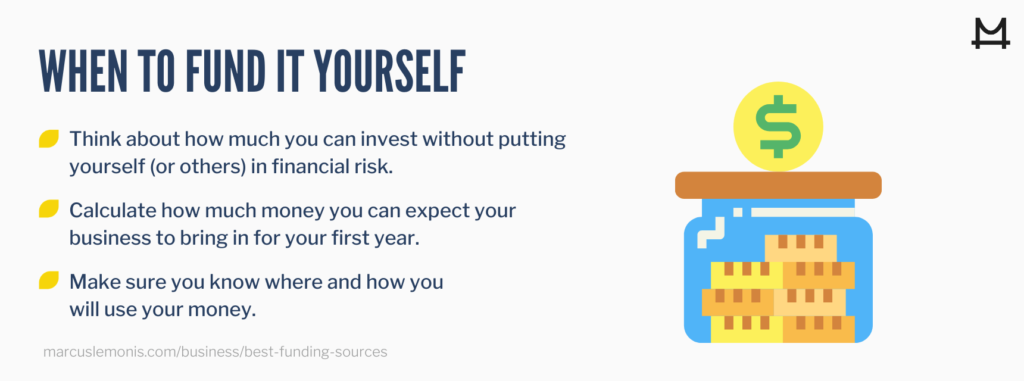
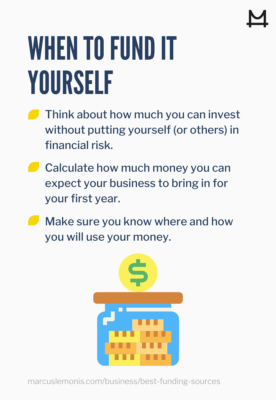
Offer Up a Piece of the Pie
Debt financing is the classic way of getting funding sources for business, but you probably know it by a different name – getting a loan and paying it back with interest. Loans come with strings attached, but you won’t have to give up any business collateral. Of course, you will have to pay back your loan amount with interest. And you’ll have to put together a solid business plan backed up by data-driven projections to secure a loan. Still, debt financing is one of the most traditional and well-used ways to fund your dream.
Rely on an Angel
Angel investors are wealthy individuals who invest large sums of money in many early-stage projects hoping that at least one will return massive dividends. For angels, this is very much a high-risk, high-reward situation. For you, it can be a godsend for getting your business to a stable, productive, and lucrative place. Take, for example, the owner of a gourmet candy store in the Southeast. After things turned sour with his business partner, he turned to Marcus for help and financial support. In exchange for an ownership share in the business, Marcus invested the capital the company needed in order to buy and refurbish a new building, improve processes, and expand the product offerings. Today, the store is thriving, expanding into new cities, and has become a tourist destination in its flagship city. Entrepreneurs and small business owners looking to create a company that can expand quickly use these seemingly miraculous funding sources for business. In exchange for their cash, angels may take some control of your company’s business or day-to-day management.
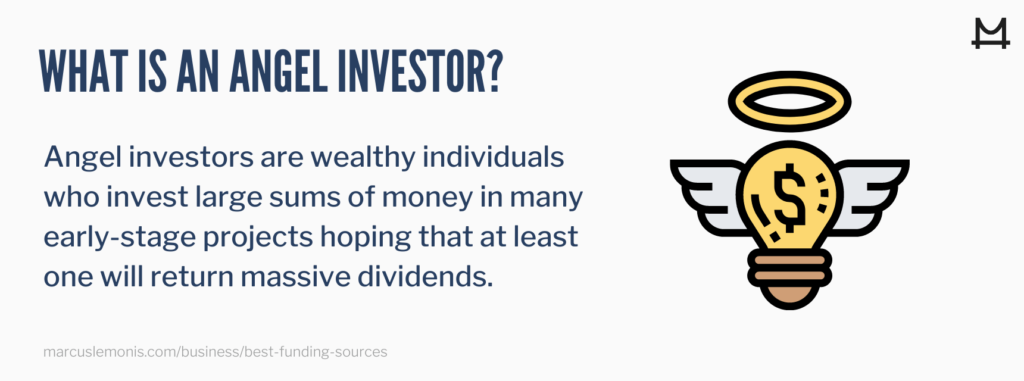
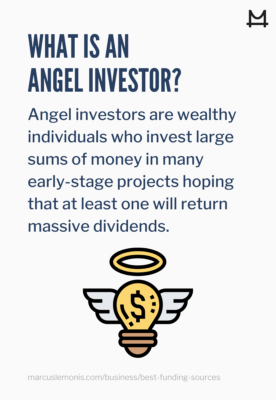
Nothing Ventured, Nothing Gained

Venture Capitalists (VCs for short) are firms made up of investors who infuse money into small companies or startups. Their goal is to buy a stake in a company that is on the verge of rapid expansion. If you’re looking for funding sources for business and your idea is scalable and ready to take the world by storm, VCs could help you out – In exchange for a percentage share in your company, that is. Basically, it’s having “skin in the game,” as Marcus refers to it. One of the downsides to using a VC firm is having set-in-stone goals to achieve to receive your next round of funding. Also, along with their money, come their voices. They will have a say in how you run your business.
Grow Inside an Incubator
Funding sources for business have changed a lot in a short time. One of the newest options is a business incubator. Unlike some of the other options listed in this article, incubators require their potential clients to apply for help. In that sense, it’s a lot like the university experience. If you’re one of the lucky prospective entrepreneurs who are accepted, you can receive help building your company. You will also get to work around other entrepreneurs with a similar mindset and goals. Some incubators are for-profit, and some are non-profit. Each incubator is different, but most of them focus on providing help to small business owners who lack specific resources or knowledge. Incubators commonly help find rental properties, accountants, and networking connections in the pivotal early days of a startup. One of the most-popular technology incubators is Y Combinator. They offer $125,000 in startup costs, introduce their clients to business connections, and refine investor pitches for further rounds of financing. Some of Y Combinator’s famous clients include Airbnb, Twitch, Instacart, Dropbox, and DoorDash.
Let Your Taxes Work for You
Government grants and subsidies are great funding sources for business.
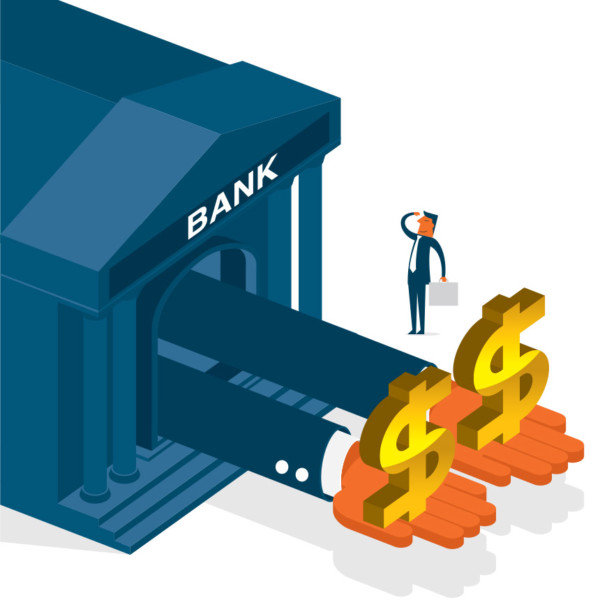
Federal grant systems like Grants.gov allow you to apply for small or large amounts of money. Their purpose is to stimulate the economy and to help guide society in a positive direction. There are hundreds of grants available for all sorts of small business owners at any given time. It would be best if you also looked into the U.S. Small Business Administration. They can help you plan your goals, help launch and register your company, learn ways to be a better manager, and even help you secure a lucrative government contract. Competition for government grants is fierce, however, so you should investigate and apply for every grant that fits with your business model, and you should do it often.
Take It to the Bank
Bank loans are traditional funding sources for business. In fact, it’s basically just another way to say debt financing, except you’re specifying exactly who will be providing you with your capital–a bank or credit union. There are two typical financing options when you consider a bank loan. There are credit lines that offer you an ongoing fund for day-to-day expenses, much like a credit card. Then there are business loans for making large investments, like leasing a property or buying expensive machinery.

These business loans are usually paid to you in a lump sum, and you have to pay them back according to a schedule you worked out with your bank. There are interest charges involved with both of these options. There is one more thing. Bank loans are either unsecured, meaning you haven’t offered any collateral such as property, vehicle, or other valuable assets to the bank if you default on the loan, or secured loans, meaning that you have offered up assets in case of a default. Interest rates will be higher for an unsecured loan, but they are still used every day by entrepreneurs who need a little more help to build their company.
Share It With a Crowd
Crowdfunding websites are new and exciting funding sources for business owners. Simply put, crowdfunding is when you put together the best pitch presentation you possibly can, and then you put it online. If enough average Joes like your idea, they each chip in a few bucks until you reach a set monetary goal. Those investors receive the first round of products or a steep discount on the goods you are offering in exchange.
Basically, crowdfunding is a form of “alternative finance,” an idea that tries to cut the middlemen (established financial institutions and investors) out of the loan process. Kickstarter, Indiegogo, Patreon, GoFundMe, and LendingClub are all websites that help people crowdfund. Your presentation has to stand out from the crowd because many budding entrepreneurs are competing for cash. How many? Financial website Fundera estimates that there will be 12,063,870 crowdfunding projects worldwide by 2023. (Shepherd, 2020).
A great example of this is a Midwest business owner who needed funding for a mobile food truck so that he could take his delicious lobster rolls to the streets. Having owed hundreds of thousands of dollars to family investors, the owner decided to crowdfund to raise money – a fresh idea he hoped everyone would want to get their hands on. Although he was able to raise a good percentage of the needed funds through crowdfunding, the business owner was still under financial stress. That’s when he turned to Marcus for help. Marcus invested enough into the business to make up the deficit needed and helped the food purveyor perfect his processes along the way, leading to a successful venture for everyone involved.
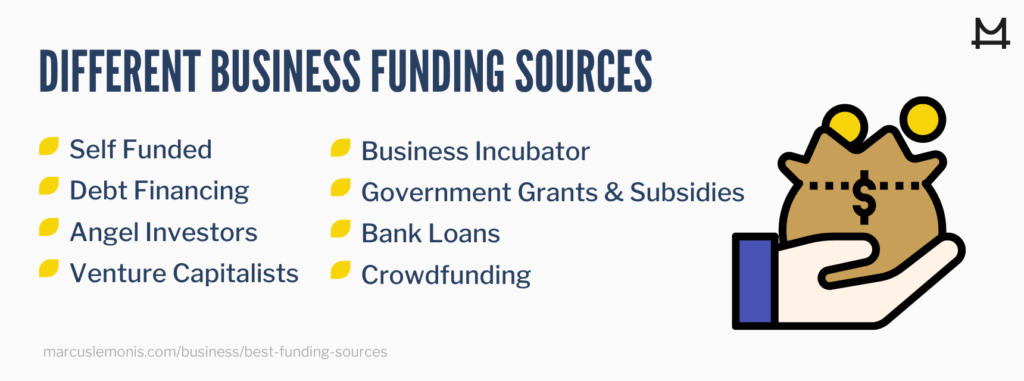
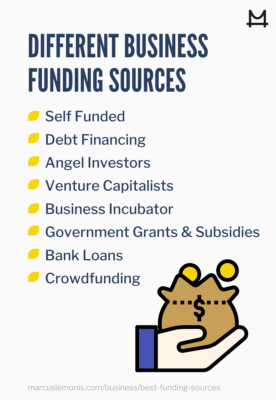
Believe In Your Dream
Whichever funding sources for business you choose, rest assured that everybody who has ever launched their bright idea into the world has felt the way you feel now. Entrepreneurs and small business owners are cut from a different cloth, one of determination and perseverance. Apply those skills to securing a bank loan, or presenting a pitch to angel investors, or even asking complete strangers online to believe in your idea.
And, if at first you don’t succeed, there is always another option available to you. Once you do secure funding, make sure you “control your cash, stick to your core business, and know your numbers,” as Marcus has said. Take his advice and you’ll be well on your way to success.
- What funding sources does your business currently have?
- What other funding sources can you look into for your business?
Wehrum, K. (2009, Dec. 9). The great leaders series: Michael Dell, founder of Dell Computer.
Retrieved from https://www.inc.com/30years/articles/michael-dell.htmlShepherd, M. (2020, Feb. 3). Crowdfunding statistics (2020): market size and growth.
Retrieved from https://www.fundera.com/resources/crowdfunding-statisticsYcombinator.com. (n.d.). Y Combinator created a new model for funding early stage startups.
Retrieved from https://www.ycombinator.com/





